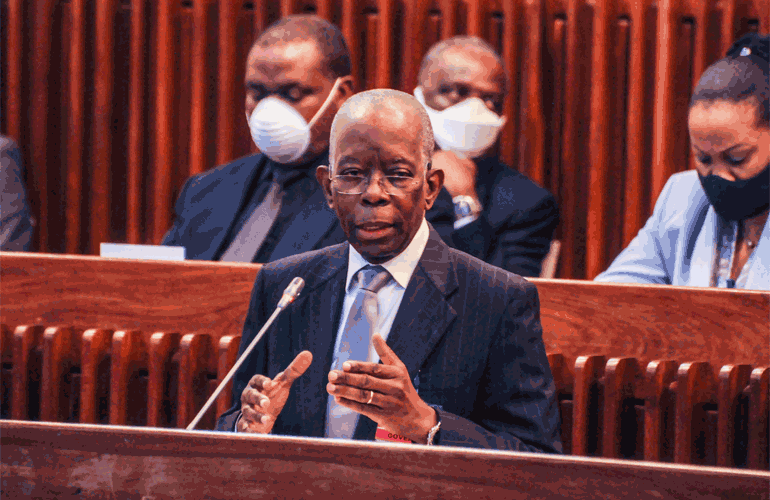Mozambique: Economy shrank almost 4%% in the first quarter, 6% in Q4 of last year - INE
Mozambique: Government committed to debt sustainability – Maleiane

Photo: Noticias
Mozambique’s total public debt is equivalent to about 13 billion US dollars, said the Minister of Economy and Finance, Adriano Maleiane, on Thursday.
About 2.3 billion dollars of the total is domestic debt, and the rest foreign debt, he added.
He was speaking in the Mozambican parliament, the Assembly of the Republic, during the debate on the General State Account for 2018. 84 per cent of the debt is multilateral (owed to institutions such as the World Bank and the African Development Bank) and bilateral (owed to other states).
ALSO READ: Mozambique Administrative Tribunal says Government continued to violate debt rules in 2018
Which means that 16 per cent is commercial debt – of which the largest and most controversial part is the repayment of loans made to the three fraudulent, security-related companies Proindicus, Ematum (Mozambique Tuna Company) and MAM (Mozambique Asset Management).
Maleiane said the government is working with the initiative from the G20 group seeking to persuade creditors to help countries reduce their debt service or even suspend the debt service “at least in this current phase of the Covid-19 pandemic, in order to obtain resources to meet health needs”.
The government, he continued, has been working to bring the debt to sustainable levels “since 2015” – i.e. since President Filipe Nyusi took office and appointed Maleiane Finance Minister. Implicitly, Maleiane was blaming the previous government, under Nyusi’s predecessor, Armando Guebuza, for unsustainable levels of debt.
By the end of 2015, “all the indicators of debt sustainability were good. But in 2016, because of currency depreciation, we went beyond the limits of some indicators”.
Maleiane failed to mention that the Mozambican currency, the metical, crashed in mid-2016, precisely because of the country’s debts. It was in April 2016 that the full extent of the illicit Proindicus, Ematum and MAM debts became public knowledge: the illegal loans to these companies were in excess of two billion dollars, and since the loans had been guaranteed by the Guebuza government, the Mozambican state was liable.
The IMF accused the government of concealing the country’s true debt situation, and suspended its programme with Mozambique. All 14 donors who had provided direct support to the state budget froze further disbursements, and to this day direct budget support has not resumed. The exchange rate of the metical against the dollar and other major currencies went into a tailspin, and was only rescued by tough monetary measures imposed by the new governor of the Bank of Mozambique, Rogerio Zandamela.
After the 2016 crash, the government, Maleiane recalled, published a decree in 2017, on how debt should be contracted in future. By making debt sustainable, he argued, the country would facilitate access to international markets to finance the economy.
“We are being successful”, he claimed. “As you know, we have been taken off the list of defaulting countries. We have operational gas projects. The IMF is coming back to having programmes in Mozambique. We have to work so that the whole world once again believes that our country complies with its obligations”.
The opposition parties had accused the government of continuing to pay the illicit debts incurred under Guebuza. Renamo deputy Venancio Mondlane gave a blow by blow account of the payments, particularly to the bondholders who inherited the Ematum loan.
“With regard to paying the Ematum coupon to the bank Credit Suisse by IGEPE (the government Institute for the Management of State Holdings), I must clarify that this coupon was issued in 2013, but was not processed until the 2015 financial year”, Maleiane said. “In subsequent years no reference is made to this payment, but to regularising the debt that IGEPE incurred with Mozambican banks”.
IGEPE is an Ematum shareholder (with 34 per cent) and resorted to a loan from the banks to pay off the Ematum coupon. The regularisation of the IGEPE debt was what was in the 2018 General State Account, said Maleiane.
He claimed there were no other payments because all the debts declared illegal and unconstitutional “are now before the courts”.
This skips over the restructuring of the ex-Ematum bonds in May 2019, and the payment of interest to the bondholders in March this year.
Since the Constitutional Council, the country’s highest body in matters of constitutional law, ruled the Ematum loan and guarantee null and void in June 2019, any subsequent payment is clearly illegal.












Leave a Reply
Be the First to Comment!
You must be logged in to post a comment.
You must be logged in to post a comment.